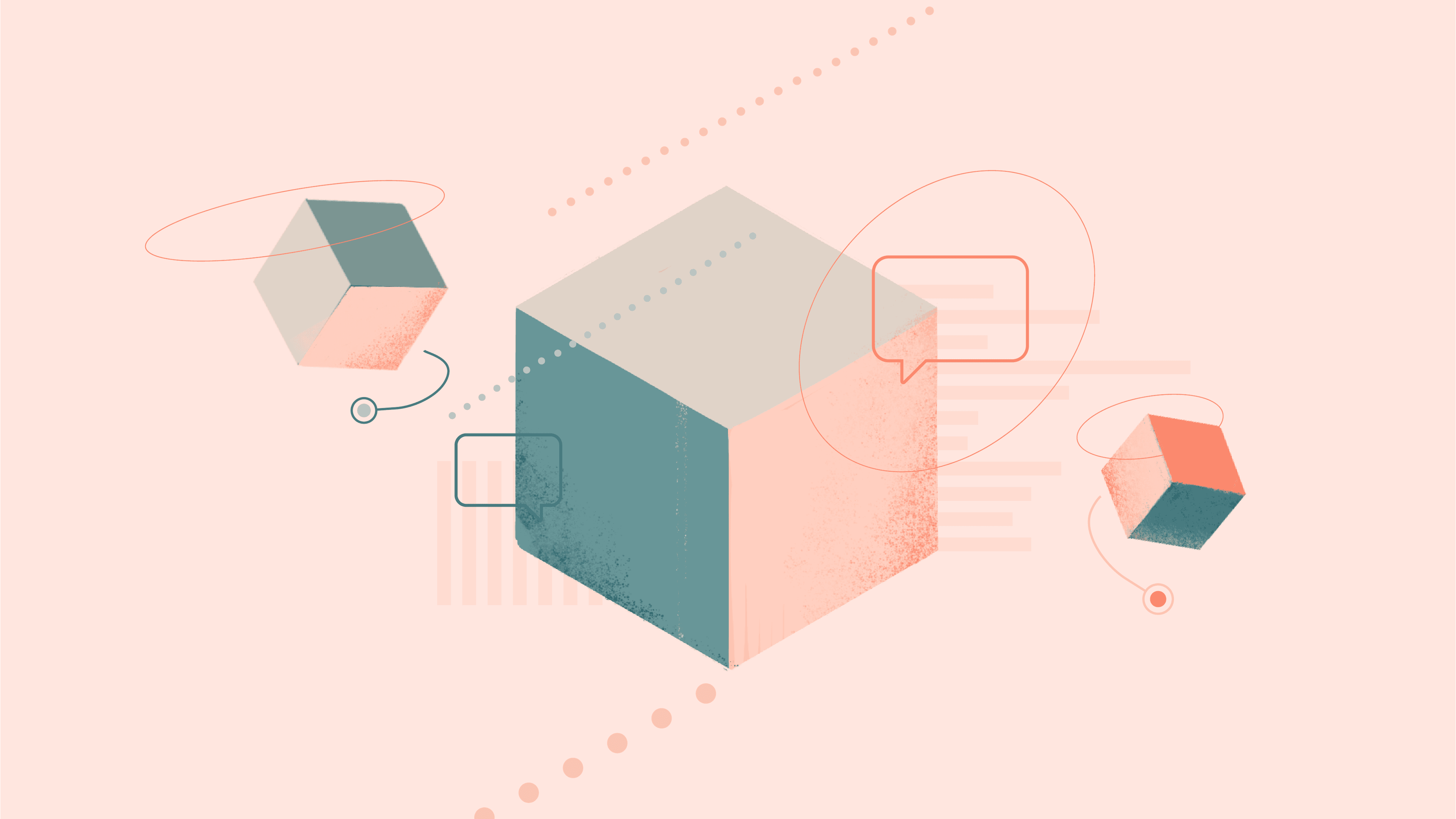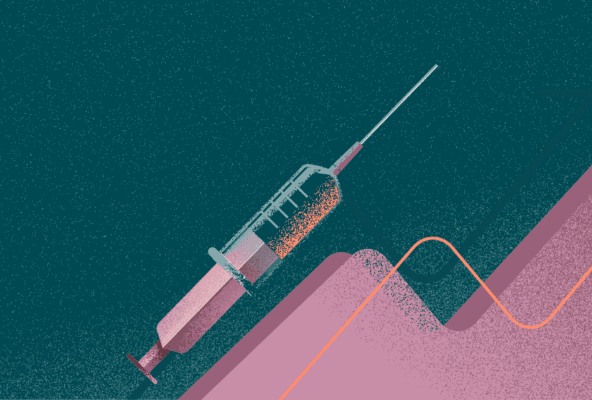Overview
- Over 10% of healthcare professionals in the US use AI, and nearly 50% plan to in the future; but 42% remain unenthusiastic, citing human interaction and data privacy concerns
- 8 in 10 Americans believe AI can enhance healthcare quality and accessibility
- Among AI chatbots, ChatGPT ranked highest in a survey with healthcare professionals for addressing patient queries
AI-powered chatbots, like ChatGPT, have become popular tools for quick and accessible health advice. But is the information they provide reliable? We surveyed 1,000 Americans and an additional 500 healthcare professionals about their thoughts on AI tools in healthcare.
Here are some of our key takeaways:
- Over 1 in 10 healthcare professionals use AI technologies, and almost 50% intend to adopt these technologies in the future.
- Among healthcare professionals, ChatGPT received the highest score for addressing patients’ questions the best.
- Of healthcare professionals who experienced a perspective shift after reviewing AI’s medical advice, 95% shifted toward a more positive perspective.
- 8 in 10 Americans believe that artificial intelligence has the potential to improve the quality of healthcare, reduce costs, and increase accessibility.
- 1 in 4 Americans are more likely to talk to an AI chatbot instead of attending therapy.
- 1 in 4 Americans would not visit a healthcare provider who refuses to embrace AI technology.
But how exactly do people use AI, and what are the perceived benefits? Which AI tools give the best health advice, according to experts?
Healthcare professionals’ views on AI
The healthcare industry constantly evolves with new technologies and practices. Adopting AI into patient healthcare would be a natural next step. Find out ways AI is already being used in healthcare, and what professionals see as its benefits and drawbacks.
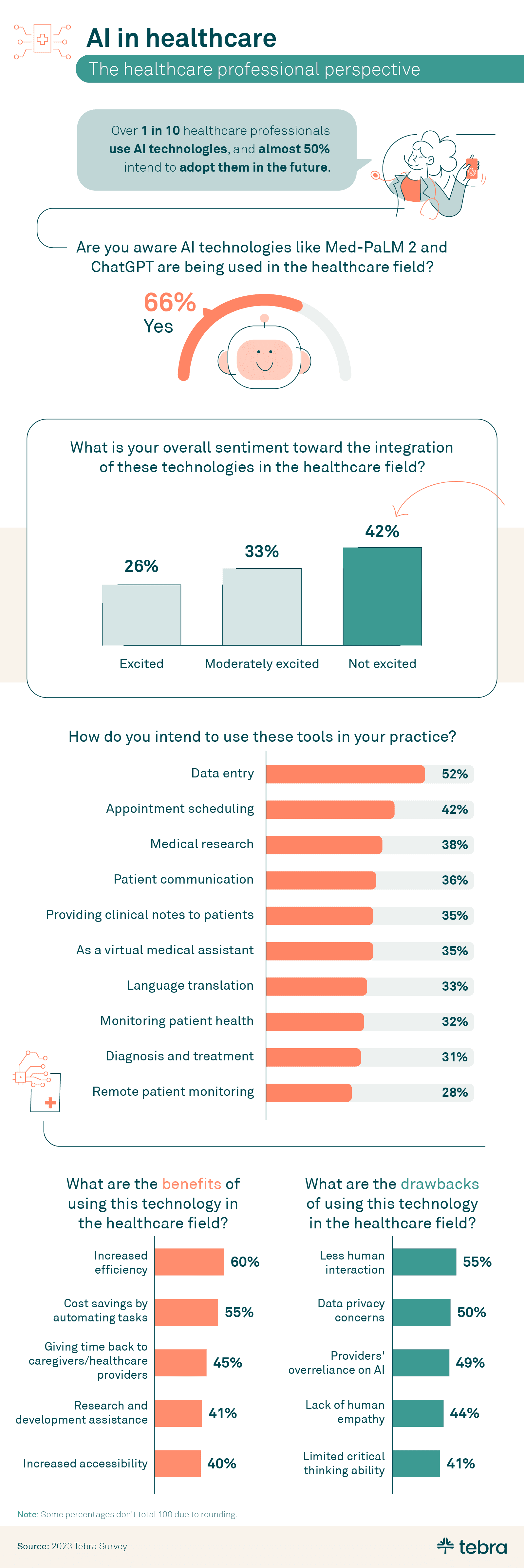
We found that more than 10% of American healthcare providers use AI as part of their practice in one way or another. As for the rest, nearly half of the health professionals we surveyed said they plan to use the technology in the future for things like data entry, appointment scheduling, and even medical research. Medical professionals may be assisted in their research after the release of Google’s Med-PaLM 2, an AI tool designed to answer medical questions accurately.
Widespread adoption of AI for healthcare tasks may be on the horizon, as 66% of respondents said they already know how the medical field could use tools like Med-PaLM 2 and ChatGPT. These experts expect AI automation to improve efficiency, cut costs, and increase accessibility. However, skeptics worry that it may limit human interaction, compromise data privacy, and lead to an over-reliance on AI among healthcare providers.
The presence of these elements is likely why 42% of healthcare professionals do not feel enthusiastic about the use of AI technologies in the healthcare industry.
American perceptions of AI in healthcare
It’s important for patients to feel heard in healthcare, so how do they feel about AI in the doctor’s office? We asked the non-experts:
- How they use AI for healthcare
- What they like and dislike about it
- What they think of AI-enabled providers
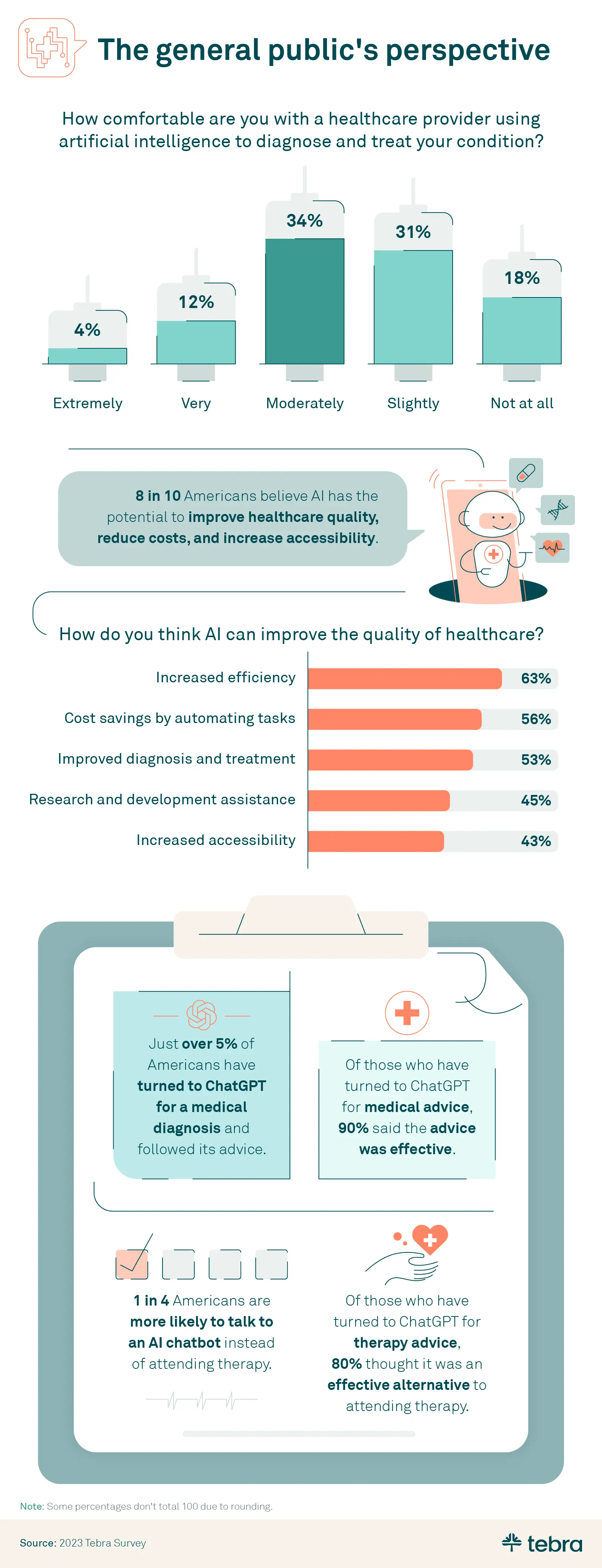
Much like the healthcare professionals, most of the other Americans we surveyed (8 in 10) said they believe AI has the potential to improve the quality of healthcare, reduce costs, and increase accessibility. One-quarter even said they’d prefer talking to an AI chatbot over a human therapist. Of those who have already turned to ChatGPT for therapy advice, 80% felt it was an effective alternative.
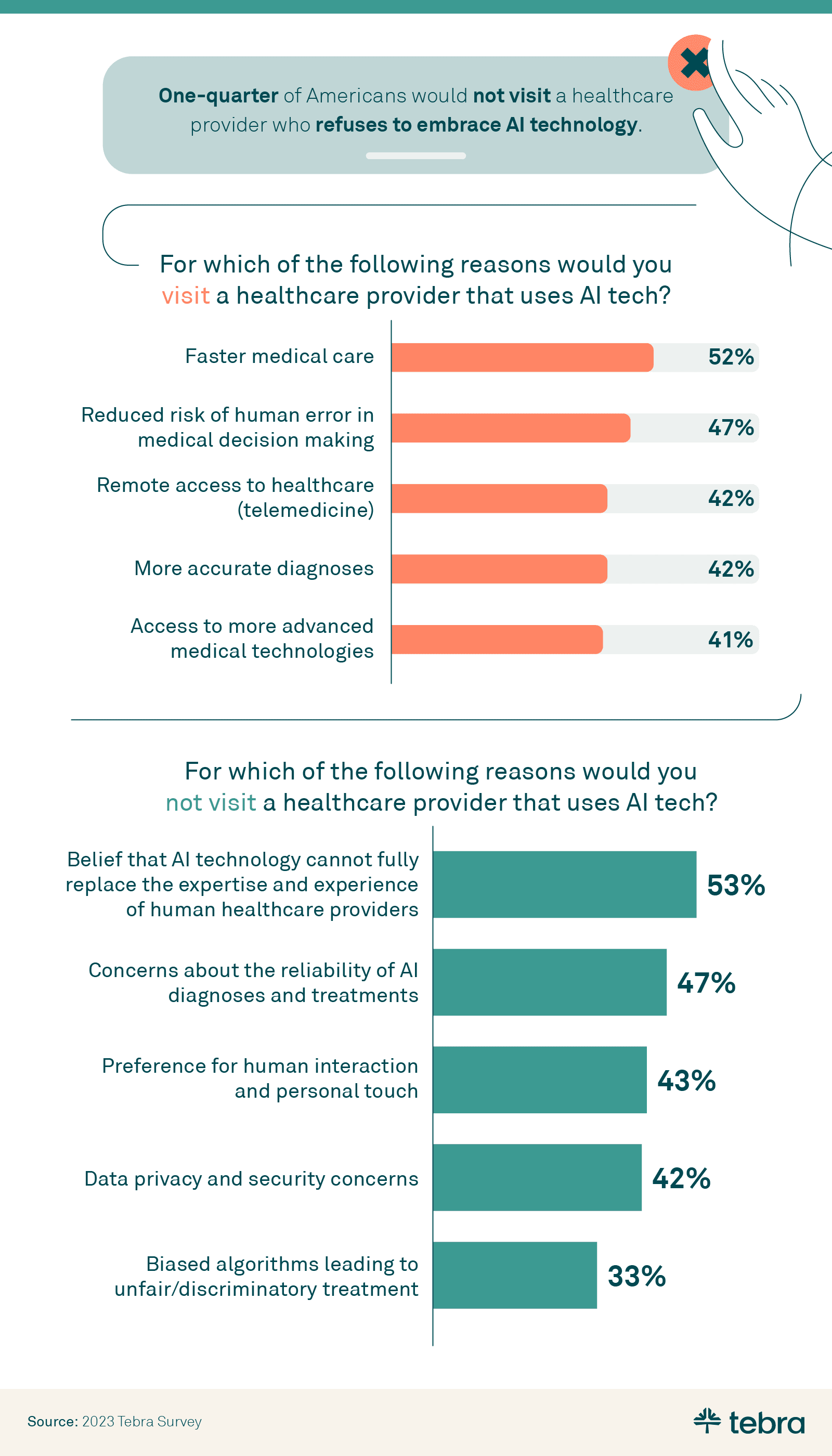
Showing a similar sentiment, one-quarter of our respondents said they wouldn’t visit a healthcare provider who refuses to embrace AI technology. The top reasons patients wanted AI in healthcare were:
- Faster medical care
- Less potential for human error
- Remote healthcare access
Still, many people expressed caution: 53% of Americans felt that AI can’t replace the experience of a human health expert, and 43% preferred human interaction and touch. Furthermore, 47% worried that AI may not yet be able to diagnose and treat health conditions accurately.
The ways that AI can help the healthcare industry seem endless, from video games that streamline mental health assessments to data visualizations that benchmark hospitals based on mortality and readmission rates. Some providers and patients are already using AI chatbots for healthcare assistance.
Head-to-head on healthcare tips
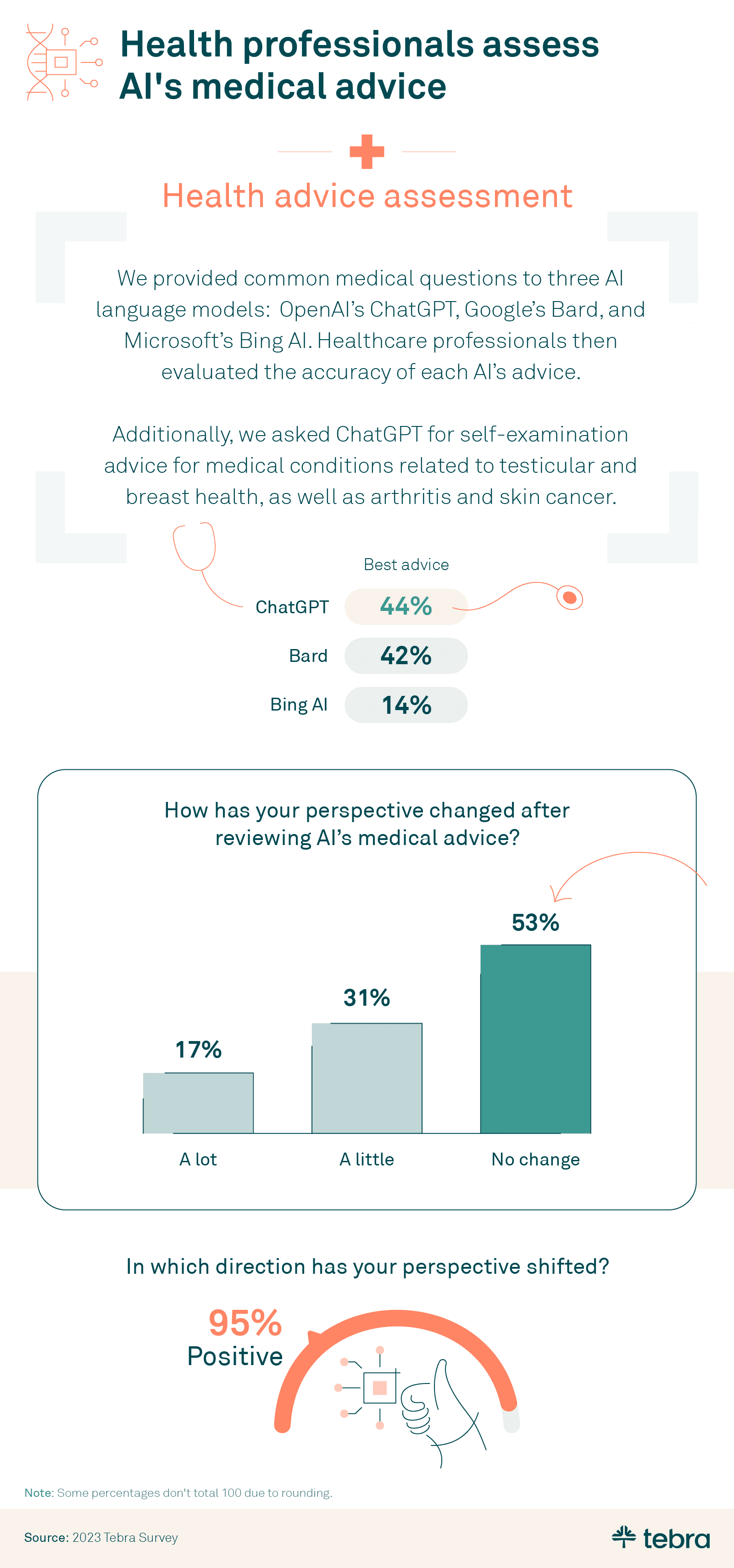






Overall, ChatGPT received the highest scores across the board from healthcare professionals, and its advice best addressed patients’ questions. After examining the medical guidance provided by ChatGPT, 46% of healthcare providers reported feeling more optimistic about the use of AI in healthcare. This represents a significant shift in perspective, with 95% of those surveyed indicating a more positive attitude towards AI technology in healthcare.
ChatGPT can also help diagnose health conditions and potentially conduct cancer detection screenings. Look at the thoroughness of these AI-generated self-examination instructions.
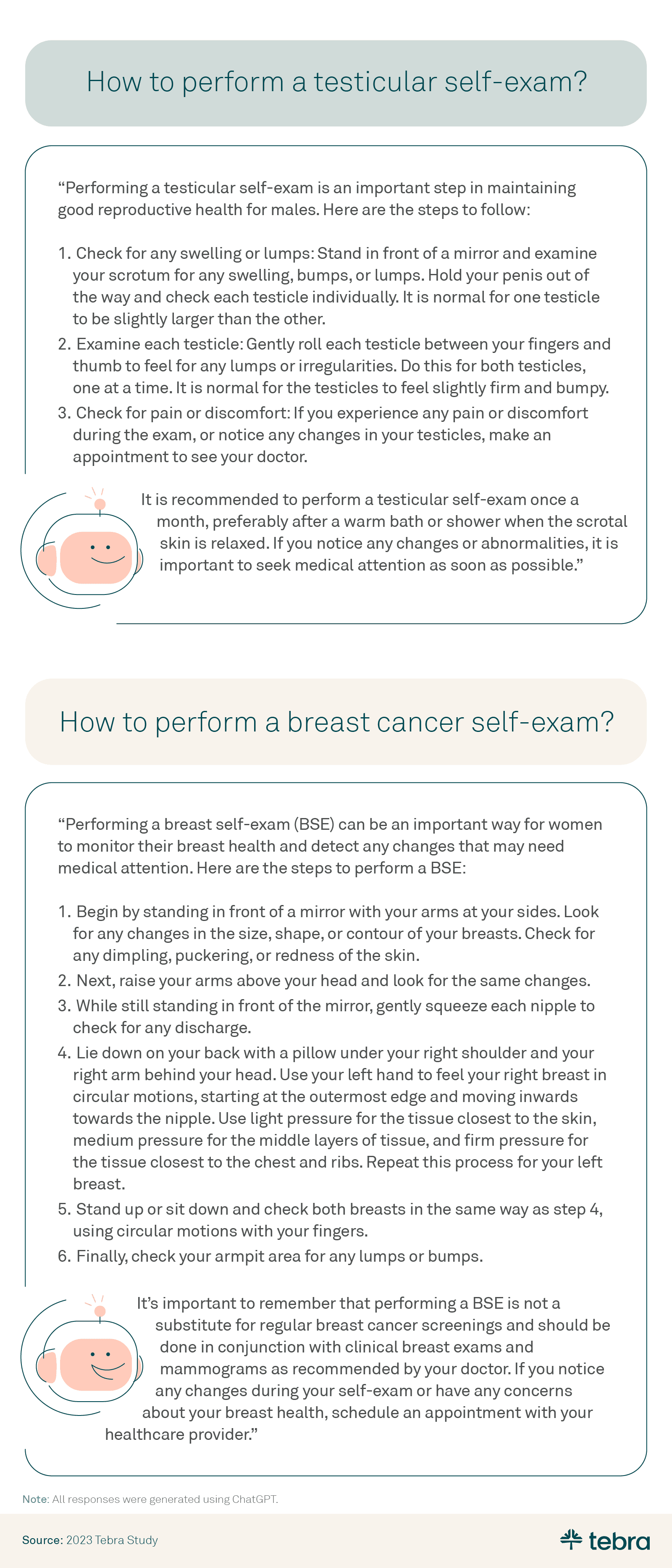
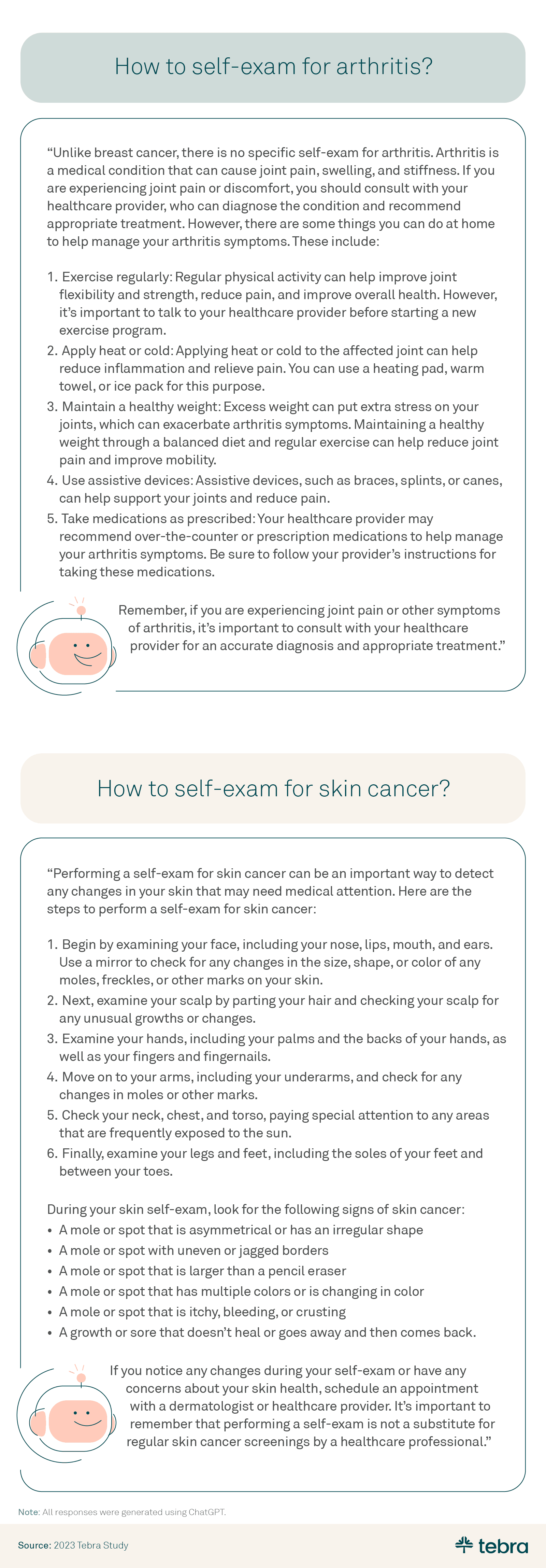
Cautious optimism
AI technology is becoming an increasingly popular healthcare tool, but its advice should be taken with a grain of salt. While most Americans and healthcare providers are optimistic about the benefits of AI in healthcare, concerns remain about the accuracy and reliability of the information it provides. Patients’ data privacy also remains of the utmost concern in the healthcare industry. As these technologies evolve, it will be critical to alleviate these concerns so AI can benefit the public with minimal side effects.
Methodology
We surveyed 500 healthcare professionals regarding their perceptions of the integration of AI in the healthcare field. The mean age of respondents was 36 years old. Among them, 48% were male, 51% were female, and 1% were non-binary. Respondents were 13% Gen Z, 19% Gen X, 61% millennials, and 7% baby boomers. Additionally, we surveyed 1,000 Americans regarding their perceptions of the integration of AI in the healthcare field. The mean age of respondents was 41 years old. Among them, 50% were male and 50% were female. Respondents were 7% Gen Z, 27% Gen X, 54% millennials, and 12% baby boomers.
About Tebra
Our mission is to provide healthcare practitioners with the technology and support they need to unlock better healthcare for every patient. That’s why we’re developing an integrated system to serve as the backbone of medical practice success.
Fair use statement
If you discovered something in our research about AI in healthcare that you’d like to share, please feel free to do so for any non-commercial purpose. Also, please include a link back to this page so readers can access our full findings and methodology.
You might also be interested in
Learn how to create a seamless patient experience that increases loyalty and reduces churn, while providing personalized care that drives practice growth in Tebra’s free guide to optimizing your practice.
